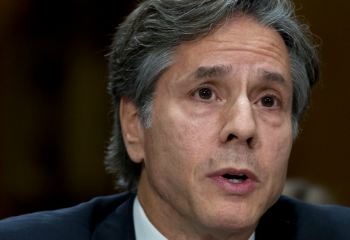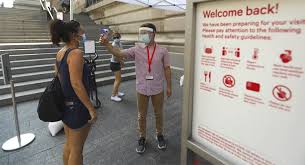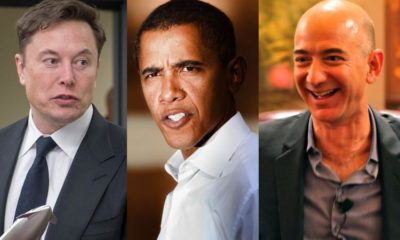World
‘Sense of unfairness’ behind protests across US: Obama

Washington: A “sense of unfairness and powerlessness” has helped to fuel protests across America that have occurred after the deaths of black men at the hands of police, according to President Barack Obama.
“By almost every measure, the life chances of the average young man of colour is worse than his peers,” he said Monday at the launch of the My Brother’s Keeper Alliance, a non-profit foundation, in New York City.
The new initiative builds on “My Brother’s Keeper” initiative launched in 2014 in an effort to help unlock the potential of young men and boys of color, particularly those who were at risk of falling out of school and the workforce.
“Those opportunity gaps begin early, often at birth, and they compound over time, becoming harder and harder to bridge, making too many young men and women feel like no matter how hard they try, they may never achieve their dreams,” Obama said.
“And that sense of unfairness and of powerlessness, of people not hearing their voices, that’s helped fuel some of the protests we’ve seen in places like Baltimore and Ferguson and right here in New York,” he said.
The protests were catalysed by “a feeling that law is not always applied evenly in this country,” Obama said pointing to statistics that show men and boys who are black and Latino are treated differently in law enforcement stops, arrests, charges and incarcerations.
Striking a personal note, Obama said: “In every community in America there are young people with incredible drive and talent and they just don’t have the same kinds of chances that somebody like me had. They’re just as talented as me, just as smart, but they don’t get a chance.”
“I grew up without a dad. I grew up lost sometimes and adrift, not having a sense of a clear path.
“The only difference between me and a lot of the other young men in this neighbourhood and all across the country is that I grew up in an environment that was a little more forgiving.”
Addressing these issues, he said, “will remain a mission for me and Michelle not just for the rest of my presidency but for the rest of my life.”
The White House says that as many as 25 percent of African American and Hispanic men between the ages of 16 and 24 can be considered “disconnected,” meaning they are neither in school nor unemployed.
One such young man can cost society nearly $1 million over his lifetime, it says.
Various business leaders, entertainers, nonprofits and current and former government officials have already put together over $80 million in commitments in support of the new initiative.
World
Lockdowns in China Force Urban Communities to Defy Censorship and Vent Frustration Online

Shanghai’s rich middle class is leading a wave of online dissent over the strict and prolonged lockdowns imposed in various parts of the country. Chinese internet censorship is struggling as patience is wearing thin in many urban centers, coming up with creative forms of online protests.
Social Media Posts Revealing Lockdown Tension in Shanghai
Drawn-out lockdowns are nothing new in China as authorities insist with the nation’s zero-Covid policy since the start of the pandemic. Currently over This time around, however, metropolitan areas like Shanghai are increasingly difficult to keep quiet, given that its more than 25 million residents have seen weeks of total isolation along with food shortages and many other service interruptions.
Dozens of towns and reportedly over 300 million Chinese citizens have been affected by lockdowns of different severity. As expected, urban netizens have been most outspoken over their difficulties by finding creative ways to get around state censorship and bans placed on topics, news comments and spontaneous campaigns.
Shanghai residents have been using mobile proxies and hijacking seemingly unrelated hashtags to talk about healthcare issues, delivery failures and the overall severity of their situation. The “positive energy” that the Chinese government wants to transmit during the recent prolonged series of lockdowns does not come naturally to those counting food supplies and online censors are working hard to filter words, trending topics and undesired social media sharing.
WeChat groups and message threads are under constant monitoring. Posts questioning the zero-Covid approach have been quickly deleted, including by leading Chinese health experts like Dr. Zhong Nanshan. Video footage is soon censored and protests and investigations are quickly made to disappear.
Where this has not worked, officials have exposed banners with warnings and outright threats like “watch your own mouth or face punishment”, while drones have been patrolling the city skies. Yet, if anything, this has led to further tensions and unspoken confrontation with Shanghai’s educated and affluent middle class.
Creative Online Solutions Harnessing Civic Energy
Announcements by Chinese social media that they would be publishing the IP addresses of users who “spread rumors” have not helped either. Tech industry research has shown that much of Asia’s tech-savvy population has a habit of using mobile proxies and other privacy tools, quickly finding workarounds to browse the internet freely and talk to the world about the hottest topics.
The sheer volume of forbidden posts is already a challenge for the very censorship system, experts explain. Unable to track all trending hashtags, state workers overlook topics that speak about the US, Ukraine or other popular news. Linking human rights elsewhere to their situation, Chinese online dissidents establish their informal channels and “hijack” the conversation to share personal or publicly relevant information about the Covid suppression in their town.
Sarcastic and satirical posts still dominate. Others hope to evade the censors by replacing words from famous poems or the national anthem. One thing is certain – social media, when harnessed with the right creativity, has proven its ability to mount pressure on the government in even some of the most strictly controlled tech environments like China.























